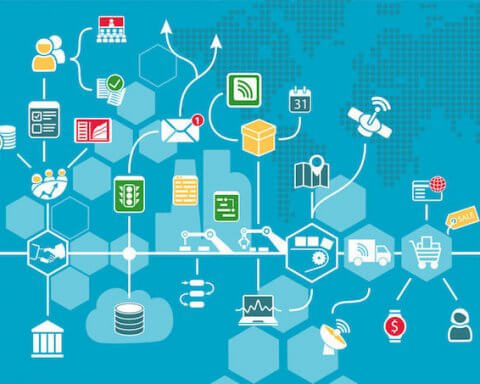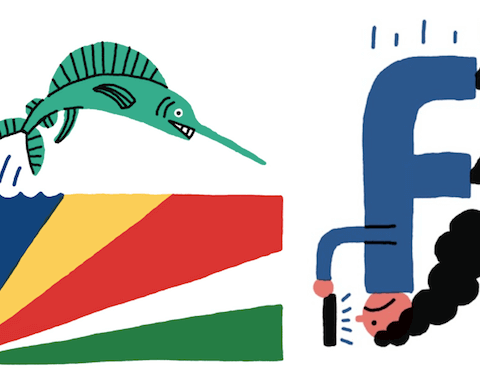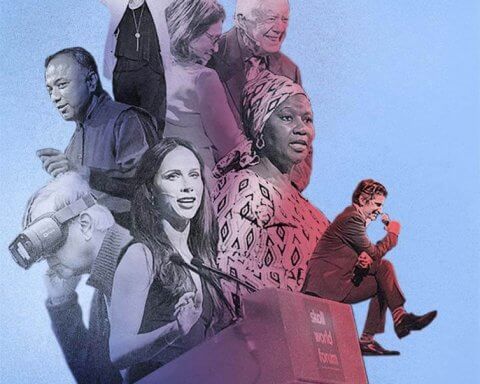If the environment were a bank, we would have saved it already.
This amusing yet sobering socialist protest mantra illustrates the misguided view our markets take of the invisible economy—the environmental goods and services like clean air and water that quietly sustain us every day, for “free.”
Slowly, the world is starting to wake up to the reality that if we don’t protect our ecosystem services, we’ll lose them forever and have a huge bill on our hands. As a result, companies are starting to take environmental and social information into account, linking their executive pay to environmental, social, and governance (ESG) criteria. Global financial news powerhouse Thomson Reuters has acquired ESG information provider ASSET4—who provided data for this ranking—to integrate its data into mainstream financial analysis. Similarly, Bloomberg’s 250,000-plus data terminals provide access to all the publicly available ESG data of over 3,000 companies, including Carbon Disclosure Project data and renewable energy use.
Retail behemoth Wal-Mart, despite—or perhaps because of—its less-than-stellar labour relations and reputation for “big-boxifying” small communities, is constantly surprising environmentalists with its green announcements, such as its move into organic and local produce, and its purchases of renewable energy. It’s currently working to develop a sustainability index for its products that will include life-cycle analysis.
And, SC Johnson, maker of eponymous products like Saran Wrap and Windex, launched its “What’s Inside” website in March 2009, which has a comprehensive ingredient list. By January 2012, it will list all ingredients on product labels and will reveal fragrance and preservative ingredient information. This required the company to demand comprehensive ingredient lists from its suppliers.
What do these things have to do with the death of philanthropy and corporate social responsibility (CSR)? Everything.
“I define CSR as the discretionary things that companies do to try to engage their communities. Philanthropy, volunteering, falls under CSR—what we used to call t-shirts and balloons,” says Sandra Waddock, the Galligan Chair of Strategy at Boston College and author of Total Responsibility Management. “But corporate responsibility or corporate citizenship is much more about the business model. If a company is just looking at CSR then it’s a second-stage company, and that’s simply not going to be enough in the future.”
CSR is built merely on appeasing various aspects of the “real” economy—reputation improvement, better public relations, tax rebates for charitable donations. But the invisible economy guides decisions around true corporate citizenship, and as we’ve seen, the two economies are beginning to merge thanks to the age of information. So building a CSR veneer isn’t going to last.
“If you’ve got a fundamental problem with your business model, in today’s world, someone’s going to find out,” says Waddock. “Very little that companies do is invisible anymore.”
That fact is especially due to the digital age. For example, the environmental, health, and social information of over 70,000 everyday retail products is available at the touch of an iPhone via GoodGuide.com’s product rating app, which includes everything from product safety to human rights controversies to carbon footprint information. ESG data provider KLD Research, owned by Risk- Metrics Group, powers its rating system.
The Internet’s breadth and depth means that consumers can register their reactions to injustices almost immediately. H&M and Wal-Mart felt the wrath of the Twitterverse in January 2010 when a New York Times article revealed that the retailers had been destroying non-saleable clothing that could have been donated during a particularly cold winter. Twitter users voiced their outrage in droves—it was the second-most popular trending topic the day after the article’s release. That day, H&M released a statement denouncing the practice and promising to investigate.
Awareness and outrage over the BP Deep Horizon spill has been largely aided by social networking. @BPGlobalPR, a satirical Twitter account mocking BP’s attempts to mollify the public, has over 121,000 followers. The oil spill and BP have been trending topics ever since the disaster began.
With issues of this magnitude coming to light, simply throwing money at various charities or serving cake at a “community appreciation day” isn’t going to satisfy the increasingly savvy consumer or investor.
Bob Willard, an expert on corporate sustainability strategies, says it would be a “disaster” for companies to simply engage in a cheque-writing exercise to fulfill its societal duties. Chris Jarvis, co-founder and senior consultant of Realized Worth, a company specializing in corporate volunteering, also puts it bluntly.
“Once a company leaves the third stage of corporate citizenship [moving from being innovative to integrative], they no longer do philanthropy. They shouldn’t—it’s regressive,” he says. “It would be like leaving college and using kindergarten tools. Companies leaving stage three don’t use the word philanthropy. They talk about strategic partnerships.”
The charities that vice-president Dr. Cathy Barr deals with at Imagine Canada, a national program focused on promoting public and corporate giving, want to engage with companies on multiple levels so that they can find mutually beneficial goals.
And that way, companies have some skin in the game, according to Jarvis.
“The more self-interested a volunteer or a company is, the more reliable they are, because they’ve tied their well-being to [that of the charity],” he says. “No one wants to be a project. And too often, volunteering and philanthropy objectify the very people we’re trying to help because they become objects to fix or make better. [Instead] we should create some free space so they can understand that they have incredible value.
Jarvis gives the example of IBM, where Willard spent 34 years.
“IBM has forgone all fiscal giving in order to put their talent, networks, and skills at play,” he points out. “They’ve moved past giving computers [with strings attached] to giving computers [without strings] that can be used for making your community better.”
Making things better has become the core mantra of many companies that have come of age in the last decade—partly because of the merging of the invisible and real economies.
“Companies like Google have grown up in this new, highly connected technology era. And they have a new set of values,” points out Waddock. “Google’s [unofficial slogan] is ‘don’t be evil.’ It made the tough decision to pull out of China. It’s created a public good with access to information. You’re going to see many more of these companies that are born with these sets of values in them.”
As a result, CSR as executed by a separate department or committee is no longer relevant for these types of companies. In fact, the term CSR shouldn’t exist at all since it identifies a separate initiative for a business instead of being part of a natural, integrated decision-making process, says Peggie Pelosi, author of Corporate Karma.
Is this just semantics? While there’s nothing wrong with the activities that happen under a CSR mandate, fifth-stage, transformative companies like Seventh Generation and Patagonia—and arguably our top corporate citizen, Mountain Equipment Co-op—won’t do business if they can’t do it right, says Jarvis.
“The expectations of companies being more proactive, not only not doing any harm but actually doing good, have become really hard for companies to duck,” says Willard. “Governments and consumers have started to say that companies’ responsibility is to all stakeholders as opposed to shareholders.”
But how does a company reverse-engineer this stakeholder-oriented, integrated mindset? It’s difficult, since companies are limited by the current economic system— the one that still doesn’t fully take into account the invisible economy.
“BP really tried to transform itself to Beyond Petroleum [and failed]. Changing a huge organization is like trying to turn a tanker,” says Waddock. “Even if companies want to make responsible long-term decisions, they’re still under the quarterly microscope. The problem is more than any given company can deal with. It’s a problem of short-termism and the dominance of finance over productive capital.”
If these tankers can’t be turned, they’ll sink. Hope for the future lies in competition- forced transformation.
“The Googles and eBays are creatively destroying [the old paradigms]. Can regular companies keep up? I think you’ll see some social enterprises will succeed and grow bigger and begin to displace the big guys as consumers, investors, and employees turn to them,” says Waddock. “In a sense, it’s a free market process that’s constrained by values that say we want to make the world better, not worse.”







